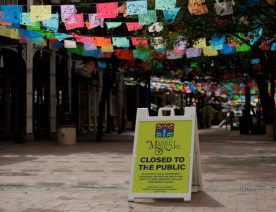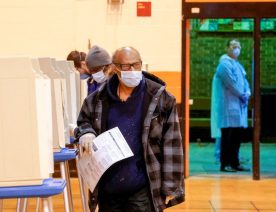
As shelter-in-place orders remain in effect in many areas of the country, Americans remain largely committed to practicing behaviors outlined by the Centers for Disease Control and Prevention (CDC)1 to limit the spread of the coronavirus. But, some groups – particularly those who live in urban areas and racial and ethnic minorities – are suffering financial and health consequences at higher rates than others.
The restrictions put in place to slow the spread of the coronavirus are beginning to take a toll on some Americans’ pocketbooks. Many households across the country include someone who has been laid off work or lost income in some other way. Those in urban areas, however, are more likely than those in suburban or rural areas to have taken unpaid time off. They are also more likely than those in suburban areas to have faced wage or salary reductions.
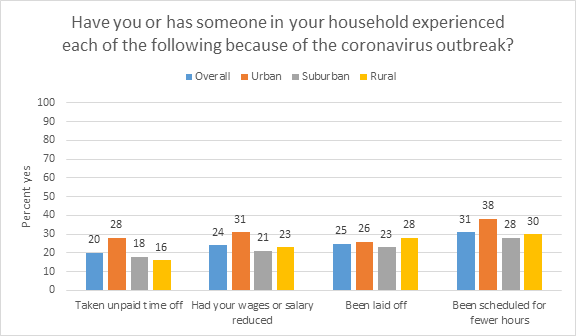
Question: Have you or has someone in your household experienced each of the following because of the coronavirus outbreak? Source: AP-NORC Poll conducted April 16-20, 2020, with 1,057 adults nationwide.
Those in urban areas are also more likely than those in rural areas to say they or a close friend or relative has been diagnosed with the coronavirus (17% vs. 7%). Thirteen percent of those in the suburbs say the same.
The coronavirus is also impacting racial and ethnic minorities more acutely than white Americans. Black Americans are more likely than white Americans to say they or someone they know has been diagnosed with the coronavirus (21% vs. 11%).
Financially, Hispanic Americans are more likely than white Americans to say they haven’t been able to make a rent or mortgage payment, a credit card payment, or some other type of payment because of the outbreak.
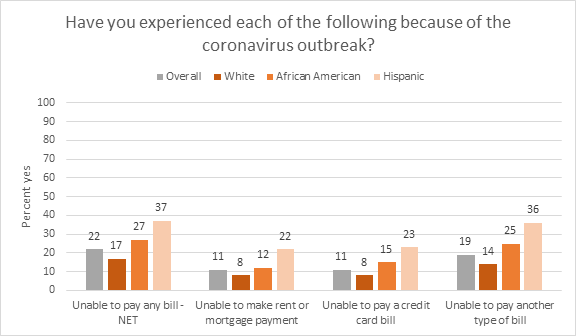
Question: Have you experienced each of the following because of the coronavirus outbreak, or not? Source: AP-NORC Poll conducted April 16-20, 2020, with 1,057 adults nationwide.
Hispanic Americans are also more likely than white Americans to say they have taken unpaid time off (33% vs. 17%) as a result of the virus outbreak.
Black Americans are most optimistic about their financial future: 50% expect their financial situation to improve in the next year compared to just 33% of white Americans.
Though some groups have been impacted more by the coronavirus outbreak, Americans across groups are doing their part to reduce the spread of the virus and to avoid infection. Nearly all report washing their hands more frequently and staying away from large groups. Large majorities are also avoiding other people as much as possible and are avoiding touching their face. Two-thirds are wearing masks when leaving home. The prevalence of these behaviors remains the same or higher compared to March.
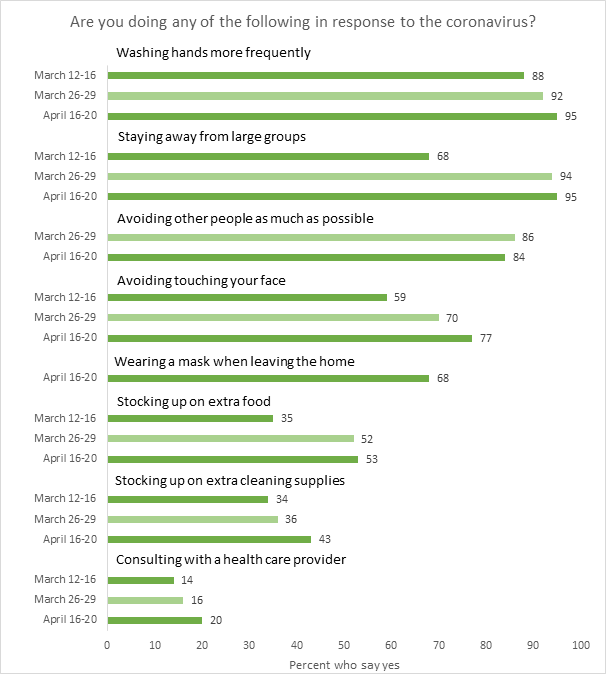
Question: Which of the following measures, if any, are you taking in response to the coronavirus? Source: AP-NORC Polls conducted March 12-16, 2020, with 1,003 adults, March 26-29, 2020 with 1,057 adults, and April 16-20, 2020, with 1,057 adults nationwide.
Though the frequency of these behaviors is holding fairly steady or increasing, somewhat fewer are worried about themselves or someone in their family being infected with the coronavirus compared to March (43% vs. 50%). But, those who are worried about themselves or someone in their family contracting the virus are particularly likely to take preventive actions compared to those who are less worried.
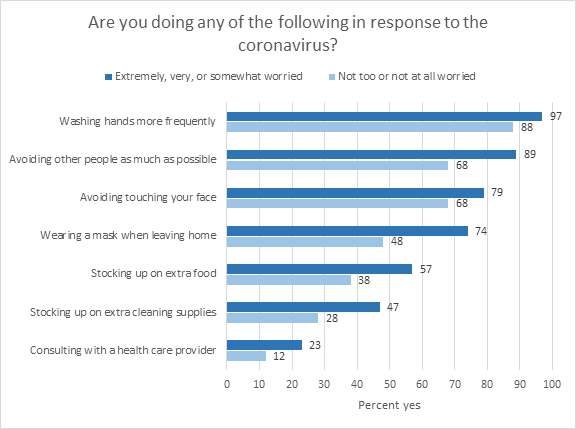
Question: Which of the following measures, if any, are you taking in response to the coronavirus? Source: AP-NORC Poll conducted April 16-20, 2020, with 1,057 adults nationwide.
In addition to practicing social distancing in their own lives, Americans remain broadly supportive of social distancing measures that have been enacted across the country, including closing bars, postponing non-essential medical care, staying at home except for essential errands, and limiting gatherings to 10 people or less. Most say the restrictions in place in their area are about right (61%) or don’t go far enough (26%). Just 12% say they have gone too far.
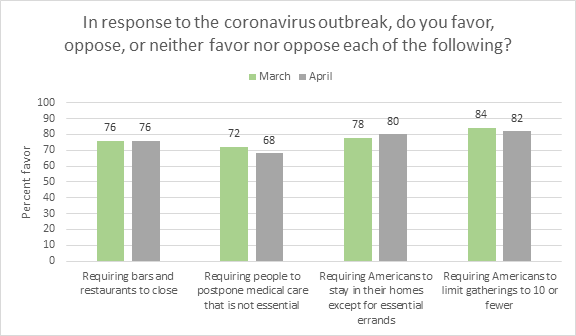
Question: In response to the coronavirus outbreak, do you favor, oppose, or neither favor nor oppose each of the following? Source: AP-NORC Polls conducted March 26-29, 2020 with 1,057 adults, and April 16-20, 2020, with 1,057 adults nationwide.
Americans are generally pessimistic that it will be safe to lift the restrictions on businesses and social life in their area anytime soon. Fifty-six percent say it is not very or not at all likely that it will be safe to do so in the coming weeks, while 27% say it is somewhat likely. Sixteen percent say it is very or extremely likely. Those who say it is not likely or not at all likely that restrictions are going to be lifted are more likely to be stocking up on cleaning supplies (28%) and food (34%), compared to those who say it’s more likely to be safe soon (14% and 18%, respectively).
Americans are getting their information on the coronavirus from a variety of sources, but they are most likely to say they are regularly getting information from the news media and their state and local government. More than three-quarters are also getting information at least occasionally from the CDC. About half get information at least occasionally from social media, friends and family, a doctor or health care provider, or Donald Trump.
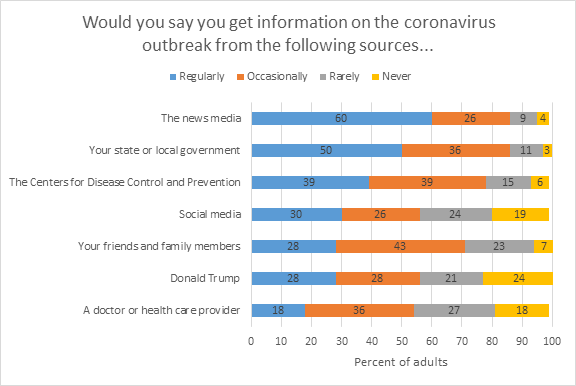
Question: Thinking about some of the ways you get information about the coronavirus outbreak, would you say that you get information from each of the following sources…? Source: AP-NORC Poll conducted April 16-20, 2020, with 1,057 adults nationwide.
When it comes to the sources they trust most, the CDC and health care providers top the list, with about two-thirds saying they trust these sources for information on the coronavirus. Half also trust information from their state or local government. Fewer trust information from the news media, friends and family, Donald Trump, or social media.
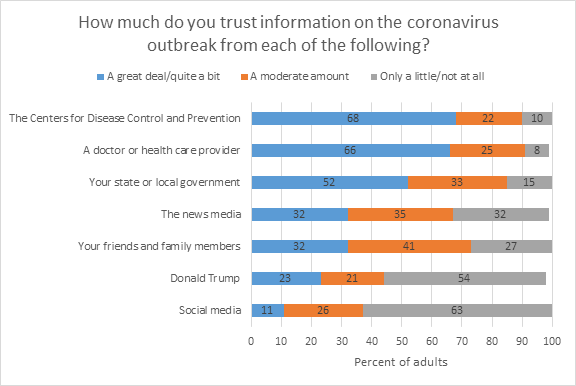
Questions: Regardless of how often you get information from these sources, how much do you trust information provided about the coronavirus outbreak by each of the following? Source: AP-NORC Poll conducted April 16-20, 2020, with 1,057 adults nationwide.
The nationwide poll was conducted April 16-20, 2020 using the AmeriSpeak® Panel, the probability-based panel of NORC at the University of Chicago. Online and telephone interviews using landlines and cell phones were conducted with 1,057 adults. The margin of sampling error is plus or minus 4.0 percentage points.
1 https://www.cdc.gov/coronavirus/2019-ncov/prevent-getting-sick/prevention.html



